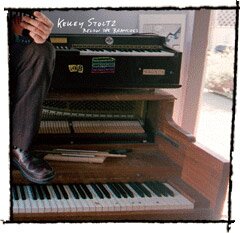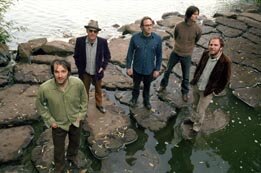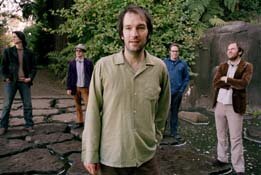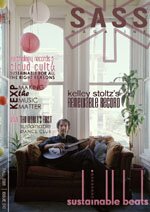

Renewable Recording: An Interview with Kelley Stoltz
Kelley Stoltz is a Sub Pop Records recording artist who teamed up with the Green-e program of the Center for Resource Solutions and Bonneville Environmental Foundation to produce a music-industry first. His latest record, Below the Branches, was recorded with 100% renewable energy credits (RECs), meaning that the energy used to power the amps, computers and other recording equipment was offset with investment in renewable energy. SASS Magazine caught up with Kelley on a tour stop for a chat about his album, his commitment to sustainability and breaking ground for musicians everywhere.
SASS Magazine: So what gave you the idea to take your gig as a musician and put an eco-friendly twist on it?
Kelley Stoltz: I’d always been conscious of throwing away my trash; I was never a litter bug and was always a recycler. I’ve used plenty of Styrofoam cups for coffee to go and always felt a tinge of guilt about it, so I started just bringing my own along. I was definitely not the most environmentally-aware person growing up, but going to from Michigan to California definitely opened my eyes to different things. I learned that it’s important to care about the world, in a way that isn’t taught in school, and if your parents aren’t into it, it’s not always a big issue. Basically, I think it was absorbing some new ideas when I moved to California. I’m good buddies with Sarah (Krasley, who works for the Center for Resource Solutions), so she and I started talking about it, and, really, I was able to help her live one of her dream ideas, which is to introduce the ideas of green energy and energy efficiency to musicians, the music industry, recording, and any of the electronic processes, really, that we use, like recording studios or even like running a record store, so I definitely stole her idea. She was the main push behind it. After we talked about what it would take to make it happen, the financial commitment was so little over the 2.5 years or so that I was recording; I record at home, so I have a big tape machine, I have about three amplifiers, and a computer that I use for mixing, and I’ve got all these things on all day long: I start recording at noon and I shut 'em off at 10 at night. The option to buy RECs was just very easy. It was a matter of doing a little math and figuring out how much we were using. It was really a painless operation.
SM: So does that change the way that you record at all? Are you thinking about that as you work?
KS: Yeah, now I leave things on all day...I don’t care (laughs). No, I don’t know that it changes the way that I record or write music or anything. I do feel that, when I talk to people about it, or we hand out the Green-e pins at my shows sometimes and people say "What is this?" and I explain what it is that tell ‘em I made my record this way, and you can check out this website for information; that’s when I think about it and feel good. It’s cool to speak with someone in Cleveland or Portland or wherever that haven’t been turned on to it, so it feels good to be out there, letting everybody know. That’s when I think about it.
SM: That’s cool. Is that the real appeal to something like RECs? That you don’t have to think about it?
KS: Totally...if I did something that took up too much brainpower when I’m trying to write a song, it’s not a good thing. It isn’t intrusive at all, so I can just concentrate on making music and being totally positive about it.

SM: Did you think about other sustainable options, other than using renewable energy to record the album?
KS: We talked about doing some things like recycled paper for the packaging of the CD and that kind of thing, but the bummer is that CDs, by their nature, are pretty destructive. I’m a huge record collector, but I know that vinyl records are about as bad as it gets when it comes to sitting around Earth for the next, you know, 9,000 years. So, until they figure out a way to do paper-free, media-free way of listening to music, the renewable energy thing seemed to be the only idea that I felt like I could really contribute while still getting the music out there and having a record for people to buy. I didn’t want to do internet-only distribution, but I also don’t want thousands of extra CDs out there that people are just gonna toss one day. It’s definitely a trade-off; I’m all for physical artifacts since I collect records myself, so hopefully my record won’t get tossed out and will end up in somebody’s collection and will become something that people will want to hang on to, like an old Beatles record that people will always want to have.
Right now, I can’t afford my own van or certainly not a bus; when it comes to touring, I’m not in any of those kind of situations, and I don’t want to own my own van just to have around the city because it’s such a headache. If I got to the point where I was making enough money and touring enough then I’d definitely think about biodiesel or other alternative fuel to take on the road.
SM: You mentioned the toxicity of CD production, and plastic and paper packaging. Where does iTunes, digital music, iPods and "album-free" music fit in your concept of being a "sustainable" musician?
KS: I think it’s cool, though I don’t use iTunes or have an iPod –- I check my email and buy records on eBay, and that’s about the extent of my computer use. I think it’s pretty interesting, but for me, I like the tactile object. I like looking at the artwork, I like reading liner notes. I don’t have paintings, I don’t have stocks and bonds, and I don’t have baseball cards, but I have my records. For me, I don’t understand people that have never bought a CD or record; they just burn ‘em and that’s it. If I were 12 years old, I might be doing the same thing. It’s just the age I grew up in and the music that I like; it was cool to go out and try to find 45s and stuff.
SM: So how do you feel when people buy your record from iTunes? Is that still cool with you?
KS: Oh, totally cool. Yeah, whatever you’re in to. Music, these days, for a lot of people, is just kinda background to activies. It’s just part of walking around to the bank, or whatever. For me, it’s always been about sitting down and listening to something. If I have friends over and we throw on a jazz record for background music, that’s fine, but I’m more of an active listener, and I feel like a lot of the downloading and burning stuff serves a lot of people who’s #1 focus isn’t music; it’s a secondary focus to some other activity: playing volleyball, having a party, running around, whatever.

SM: You obviously "get" all this stuff: making records with renewable energy, running tour buses on biodiesel, that kind of thing. What other sort of habits do you have when it comes to making more sustainable lifestyle choices?
KS: Well, for me, probably the thing I do the most is no plastic bags. I bring my own, or just carry it home. If I go to a record shop, I have my record shop bag, and I sling it over my shoulder. I ride my bike a lot -– I don’t have a car -– so I bike my way around the city. I’m appalled -– it’s my own personal pet peeve –- to see people use stuff like plastic cups and plastic bags for about 8 seconds and then discard and then it’s gonna sit around for 150 years or whatever. I’m better about the easy stuff, like turning off lights around the house and the bag thing, but there’s lots of easy stuff to do. I feel like it all adds up.
I wish people would just stop and think about the amount of plastic bags that they’re using. It’s so ingrained in our way of life, at the grocery store, you hardly have a second to say "I don’t want that" before everything you buy is in a plastic bag. The amount of extraneous packaging we have just kills me.
SM: Why do you think there aren’t more musicians who are into the sustainable lifestyle gig?
KS: For a long time, I think the whole "green" thing has been though of as a hippie movement, you know; it involved dudes wearing Birkenstocks and all that and didn’t have much to do with rock ‘n roll. So I think a lot of it has a lot to do with people like Sarah (at CRS) and people like you guys at SSF who are music fans, but also interested and talking about renewable energy. It just seems to be coming together now. Back in the day, growing up, I remember when bands like REM and U2 and all those dudes were aware and vocal about this kind of thing, but I think there’s a lot of resistance among musicians and bands to be involved in that kind of stuff. It can look corny or feels like grandstanding, somehow. You’re saying, "I’m gonna shove my opinion down your throat because you bought my CD so I know what’s right for you and I’m gonna tell you all about it." So, I think that’s definitely a danger that a lot of groups are hesitant to really take on. Making my record with green energy was really such an easy choice, but I’m not out front, speaking about it to the masses, from the stage, but we put the [Green-e] logo on the record so if people want to learn about it, they can.
I think there’s definitely an association with musicians who feel a certain way but they aren’t sure what to do and they don’t want to turn into creatures. But there are those guys, like Neil Young, who have been into it for years. Dave Matthews is really into it, regardless of what he’s dumping out of his tour bus (laughing). REM was the first band that I remember being into this kind of stuff. They named one of their records "Green" –- they were one of the first bands that I remember really talking about it.

SM: Were you inspired by bands like REM, or does it come from a more general cultural point of view and personal experiences?
KS: You know, it’s funny, I never would have connected the two. A lot of it was just having the (renewable energy) idea suggested to me, and learning that I would really be the first one to do it, and it’d be a good chance to spread the word at Sub Pop, and see where it goes from there. (Editor’s note: Sub Pop switched to 100% renewable energy in August of this year). Now, it’s great, because some of the guys at Sub Pop were already buying green energy for their apartments, and it just kinda clicked at the same time. It was like "Hey, we got this guy who’s doing his record, I’m already doing my apartment, I’m gonna go talk to the boss."
SM: Based on the kind of things that you’ve seen and you do for a more sustainable world, what could everyone do every day to make everything a little greener and more sustainable?
KS: I’d like to see everyone start by just picking one thing. Bring your own mug to a coffee shop, or a bag to the store. Pick up renewable energy credits in your home. Stuff like that, it seems like if everyone could pick one thing and understand that their own little thing would make a big difference, they’d add a couple more along the way. It’s so much more attainable when you make small changes, and, after a couple million people, it really adds up.
SM: What about the music industry as a whole? What do you think is the next big thing – will it be renewable energy credits for all new records, or biodiesel in all tour buses, or announcements at every concert, or something like that?
KS: That’s tough. A lot of things in the music industry aren’t very efficient. We’re on tour right now (with The Raconteurs) and it takes three buses and forty people to make it go. There are always things like airplanes full of t-shirt zigzagging across the country because they got printed in LA and the first show is in Florida, or trucking the records around. That stuff is just incredible. Unfortunately, that’s the way things work right now. I don’t know that it’s going to change anytime soon. I mean, when you’re touring, you gotta play Chicago and you gotta play New York and you gotta play LA. If you can get a biodiesel bus, that’s nice, but that still doesn’t counteract the industry’s biggest sin, which is waste. Just the sheer volume of waste -– CDs, promotional materials, paper and stuff -– that come from record companies wanting to sell more records that than they can, and pouring money into promotions and printing more CDs than will ever sell and just end up in the trash. It’s just totally amazing.
I’m really glad that Sub Pop is doing good things, because it seems like a lot of major labels that are parts of huge corporations that are so far removed from writing a song, and the bigger and more impersonal they are, the more wasteful they are. The whole chain of command and bureaucracy is crazy. It’s like all these supposedly “green” magazine issues that were around all summer. All they do is put Al Gore on the cover; they don’t actually do much of anything. They didn’t print the magazine on recycled paper, or offset the emissions of the energy they used to print, and then they can sit back and point to it when people ask what they’re doing and say "Do you know what our circulation is? Do you know how many people we touched?" and I’m not sure they really care about making things better. That’s just a random example, but it would just be nice to see people put their money where their mouths are. That goes for big companies and little companies, the Entertainment Weekly's to people like Sub Pop and little guys like me, who are going to sell 5,000 records; at least that’s 5,000 people who are going to go, "What’s this Green-e thing? Oh wow, this was made with renewable energy, I want to check in to that."
But back to your question: I'm not really sure what the music industry can do, but I wouldn't depend on anybody at the top to do anything. It's guys on the bottom like me and I guys in the middle like Sub Pop, who are a big company and well-respected and been around for a long time, but it's going to take the little guys to influence the big people. It’s like, Kurt Cobain writes a song, and all the sudden there are 500 grunge bands that all sound like him and it's a million dollar industry.
Sooner or later, it's going to catch on, I think. The cool cross-pollination of sustainability and rock 'n roll that has you and I, sitting here talking right now, will work its way up, and someday the president of Sony music will be someone who understands the benefits of green energy.
SM: If you could be sitting backstage, like you and I are, with everyone who buys your record, sees the Green-e label, and wonders what the story is, what would you tell them?
KS: I guess I would just say that everyone can make a difference. You can make a simple choice to change, and it doesn't have to be exorbitantly expensive. I know everyone doesn’t have extra money lying around to buy things like renewable energy credits, for example, every year, but there are plenty of people who do. Everyone has disposable income, so it’s just a matter of choice; buy a few less records, go to a few less shows if you have to. You can figure out ways to do things that will make you feel better and do something good at the same time. I’d tell ‘em that I feel about doing what I did, and that it was relatively easy, relatively affordable, and really a painless way to make a difference. You can go about your business, do what you want to do, but there are ways to make a difference that are really easy.
Kelley Stoltz is a multi-instrumentalist and singer-songwriter from San Francisco. He records for Sub Pop Records; learn more about him at Sub Pop, his website, his MySpace page and check out Below The Branches, his latest record that was recorded with 100% renewable energy.
















